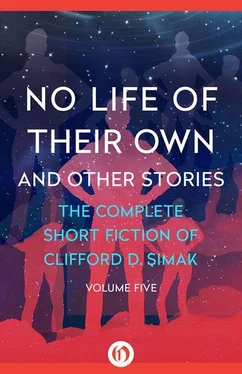Dug up, it yielded an inner container, well-insulated against heat and cold, against radiation and shock. Opened, it was found to contain seeds. Planted, jealously guarded, carefully tended, the seeds grew, were the Martian lilies. They multiplied rapidly, spread quickly over the Earth.
Back on Earth today the Martian lilies grew in every hamlet, clogged the fence rows of every farm. Relieved of whatever natural enemies and checks they might have had on their native planet, they flourished and spread, became a weed that every farmer cursed whole-heartedly.
Their root structure probed deep into the soil. Drought could not kill them. They grew rapidly, springing to full growth almost overnight. They went to unkillable seed. Which was what might have been expected of any plant nurtured on the stubborn soil of Mars. Earth, to the Martian lilies, was a paradise of air and water and sunlight.
And, as if that first token-load had not been enough, the Martians kept on sending rocket loads of seeds. At each opposition the rockets came, each announced by the messages from the Martian transmitter. And each of them landed almost precisely on the spot where the first had landed.
That took mathematics! Mathematics and a superb knowledge of rocketry. The rockets apparently were automatic. There was no intelligence to guide them once they were shot into space. Their courses must have been plotted to the finest detail, with every factor determined in advance. For the Martian rockets were not aimed at Earth as one broad target but at a certain spot on Earth and so far every one of them had hit that mark!
At the rocket camp each Martian rocket was awaited anxiously, with the hope it would bring some new pay load. But the rockets never brought anything but seeds … more Martian lily seeds.
Jimmy stirred restlessly, opened his eyes and looked out the vision plate. But there was no terror in his eyes, no surprise nor regret.
“Space?” he asked.
Scott nodded.
“We’re going to the Moon?”
“To the Moon first,” said Scott. “From there we go to Mars.”
Jimmy lapsed into silence. There was no change upon his face. There never was any change upon his face.
I hope he doesn’t make any trouble, Scott told himself. It was bad enough just to have him along. Bad enough to have this added responsibility.
For space flight was a dangerous job. Ever since the International Mars Communication Center had been formed, with Alexander in charge, space had flung men aside. Ship after ship, pilot after pilot. The task, alone, of reaching the Moon had taken terrible toll.
Men had died. Some had died before they reached the Moon, some had died on the Moon but mostly they had died heading back for Earth. For landing on Earth, jockeying a rocket through Earth’s dense atmosphere, is a tricky job. Others had died en route to Mars, ships flaring in space or simply disappearing, going on and on, never coming back. That was the way it had been with Hugh.
And now his brother, Scott, was following the trail that Hugh had blazed, the trail to the Moon and out beyond. Following in a bomb of potential death, with a blank-faced stowaway in the chair beside him.
Half way to Mars and the ship was still intact. Running true to course, running on schedule, flashing through space under the thrust of momentum built up during the blast-off from the Moon.
Half way to Mars and still alive! But too early yet to hope. Perhaps other men had gotten as far as this and then something had happened.
Scott watched the depths of space, the leering, jeering emptiness of star-studded velvet that stretched on and on.
There had been days of waiting and of watching. More days of waiting and of watching loomed ahead.
Waiting for that warning flicker on the instrument panel, that split second warning before red ruin struck as cranky fuel went haywire.
Waiting for the “tick” of a tiny meteor against the ship’s steel wall … the tiny, ringing sound that would be the prelude to disaster.
Waiting for something else … for that unknown factor of accident that would spatter the ship and the two men in it through many empty miles.
Endless hours of watching and of waiting, hastily snatched cat-naps in the chair, hastily snatched meals. Listening to the babbling Jimmy Baldwin who wondered how his flowers were getting on, speculated on what the boys were doing back in the rocket camp on Earth.
One thing hammered at Scott Nixon’s brain … the message of the Martian radio, the message that had been coming now for many years. “No. No. No come. Danger.” Always that and little else. No explanation of what the danger was. No suggestion for circumventing or correcting that danger. No helpfulness in Earthmen’s struggle to cross the miles of space between two neighboring planets.
Almost as if the Martians didn’t want Earthmen to come. Almost as if they were trying to discourage space travel. But that would hardly be the case, for the Martians had readily cooperated in establishing communications, had exhibited real intelligence and earnestness in working out the code that flashed words and thoughts across millions of miles.
Without a doubt, had they wished, the Martians could have helped. For it was with seemingly little effort that they sent their own rockets to earth.
And why had each Martian rocket carried the same load each time? Could there be some significance in those Martian lily seeds? Some hidden meaning the Earth had failed to grasp? Some meaning that the things from Mars hope would be read with each new rocket-load?
Why hadn’t the Martians come themselves? If they could shoot automatic rockets across the miles of space, certainly they could navigate rockets carrying themselves.
The Martian rockets had been closely studied back on Earth but had yielded no secrets. The fuel always was exhausted. More than likely the Martians knew, to the last drop, how much was needed. The construction was not unlike Earth rockets, but fashioned of a steel that was hardened and toughened beyond anything Earth could produce.
So for ten years Earthmen had worked unaided to cross the bridge of space, launching ships from the Earth’s most favored take-off point, from the top of Mt. Kenya, heading out eastward into space, taking advantage of the mountain’s three mile height, the Earth’s rotation speed of 500 yards per second at the equator.
Scott reviewed his flight, checked the clocklike routine he had followed. Blast-off from Earth. Landing in the drear, desolate Mare Serenitatis on the Moon, refueling the ship from the buried storage tanks, using the caterpillar tractor from the underground garage to haul the rocket onto the great turn-table cradle. Setting the cradle at the correct angle and direction, blasting off again at the precise second, carrying a full load of fuel, something impossible to do and still take off from Earth. Taking advantage of the Moon’s lower gravity, its lack of atmosphere. Using the Moon as a stepping stone to outer space.
Now he was headed for Mars. If he landed there safely, he could spend two days, no more, no less, before he blasted off for Earth again.
But probably he wouldn’t reach Mars. Probably he and Jimmy Baldwin, in the end, would be just a few more bones to pave the road to Mars.
III
A gigantic building, rising to several hundred feet in height, domed, without door or window, stood lonely in the vastness of the red plain that stretched to the far-off black horizon.
The building and nothing more. No other single sign of habitation. No other evidence of intelligent life.
The Martian lilies were everywhere, great fields of them, bright scarlet against the redness of the sand. But in its native soil the Martian lily was a sorry thing, a poor apology for the kind of flower that grew on Earth. Stunted, low-growing, with smaller and less brilliant flowers.
Читать дальше












